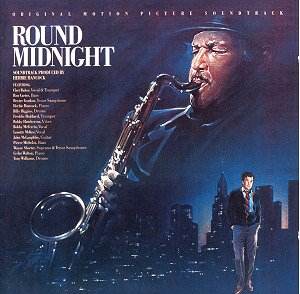Original Motion Picture Sound Track
ROUND MIDNIGHT
 Columbia/Legacy 507924
2 Columbia/Legacy 507924
2
Crotchet midprice
|
 |
- ‘Round Midnight
- Body and Soul
- Berangers Nightmare
- Fair Weather
- Una Noche Con Francis
- The Peacocks
- How Long Has This Been Going On
- Rhythm-A-Ning
- Still Time
- Minuit Aux Champs-Elysees
- Chan’s Song (Never Said)
- ‘Round Midnight (Bonus Track)
Dexter Gordon – Tenor
Herbie Hancock – Piano
Chet Baker - Trumpet & Vocal (track 4)
Ron Carter, Pierre Michelot – Bass
Billy Higgins, Tony Williams – Drums
Freddie Hubbard – trumpet
Bobby Hutcherson – Vibes
Bobbie McFerrin - Vocals
Lonette McKee – Vocal
Wayne Shorter – Tenor and Soprano
Cedar Walton – Piano
It was a minor miracle that this film ever got made
and a major one that it was successful! Jazz has always been a minority
interest and a re-creation of it’s past, has to be very well done for
the general public to take an interest. In the case of this film it
was well done and the acting ability of Dexter Gordon was a big plus.
The story is based around the Paris jazz scene during
the time when both Bud Powell and Lester Young were residents there
in the early 50’s. Dexter Gordon knew both men well and had frequently
played with them. The film’s producers made a good decision not to try
to use music from the past, but bring in the very talented Herbie Hancock
as Musical Director. It was he who created the whole musical score,
which is so much a part of the story of Dale Turner, an ageing jazz
musician, played by Dexter Gordon.
Dexter, who was 63 at the time the film was made, was
six foot five and the coolest dude on the jazz scene. Always suited
and immaculately dressed he was an impressive figure. He played with
immense deliberation and often, in a trademark way, slightly behind
the beat. Unlike a lot of his contemporaries in jazz, he came from a
good family and had the benefit of a college musical education.
The opening track with its Bobby McFerrin vocal, has
a haunting quality, it is the films theme music. The next track Body
and Soul is a feature for Dexter and Herbie Hancock on Piano.
Fair weather features Chet Baker both playing the trumpet
and singing this Kenny Dorham composition. Like Dexter, Chet had experienced
problems with narcotics, which affected the careers of both men.
Una Noche con Francis has Wayne Shorter as well as
Dexter on tenor, this one did not get recorded on one of Dexter’s better
days. The Peacocks is a difficult tune to play or for that matter understand,
but Wayne Shorter plays a good version here on soprano, there is also
a good reading of the tune from Herbie Hancock.
How Long Has This Been Going On has a vocal from Lonette
McKee with tenor obligato from Dexter. Rhythm-A-Ning has him on home
territory playing with trumpeter Freddie Hubbard, Cedar Walton on keyboards,
Ron Carter on bass and Tony Williams on Drums. Strangely there is no
chorus from Dexter.
Still Time is a Herbie Hancock composition, the sleeve
notes say that Dexter plays tenor, but I think it is soprano played
by Wayne Shorter! Minuit aux Champs Elysees, a Henri Renault theme,
is played as a duet between Hancock and vibes man Bobby Hutcherson.
This is a very nice piece of work; the interaction between them is a
joy to the ears. Chan’s Song brings back Bobby NcFerrin on vocal to
create a sub theme.
In truth there is not a lot of playing from Dexter
Gordon on this album and the inclusion of the bonus track from a 1977
session at the Village Vanguard, is very welcome. This version of ‘Round
Midnight gives a much better picture of his real ability. Three years
after the film was made Dexter died his lifestyle, like that of a lot
of jazz musicians from that era had been affected by drug abuse. It
makes his acting performance even more remarkable, considering that
in 1987, when the film was made he was already in poor health.
Dexter Gordon’s influence on the tenor saxophone in
jazz should not be underestimated. He first came to prominence in the
1940’s playing in big bands. His tenor battles with Gene Ammons and
Wardell Gray sparked many a concert for the Lionel Hampton band. He
spent most of the 1950’s incarcerated for drug offences, but in the
1960’s he played to rapturous audiences at the Village Vanguard in New
York.
In 1962 a two-week booking at Ronnie Scott’s in London
turned into a two-month booking and the word was out throughout Europe
that Dexter was back and playing well. He did the European Jazz Festival
circuit and became a resident first of Paris then Copenhagen.
He went back to the US in the 70’s and again was in
big demand, by the time he made this film his musical abilities may
have been on the wane, but without him there would not have been this
outstanding film. It was fitting that the film probably enabled him
to spend the rest of his days in more comfortable circumstances than
might otherwise have been the case.
I recommend this album to all that love jazz and it’s
musicians
Four Stars